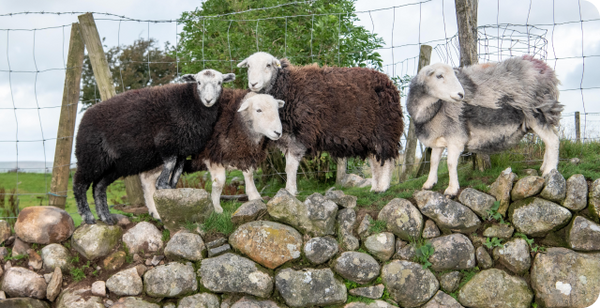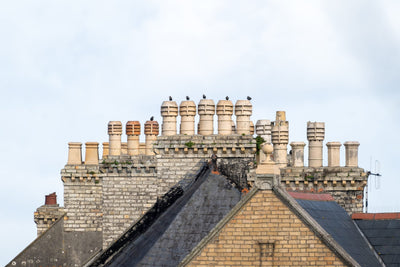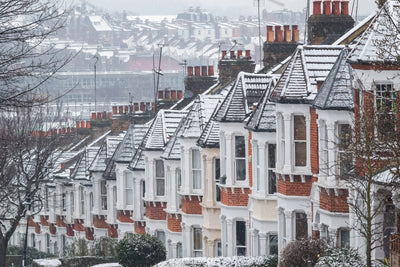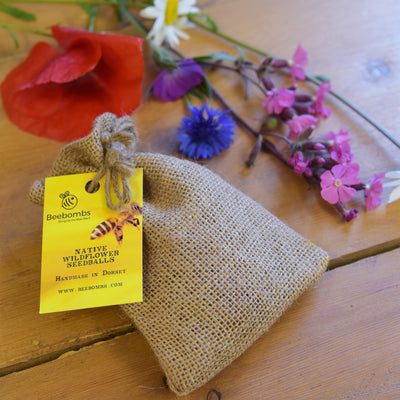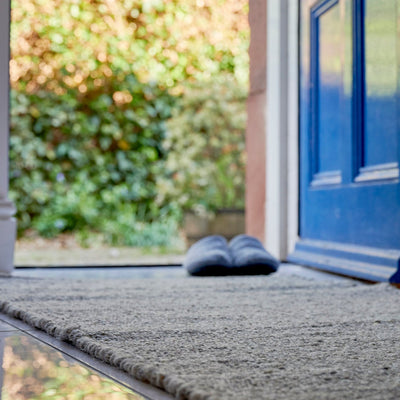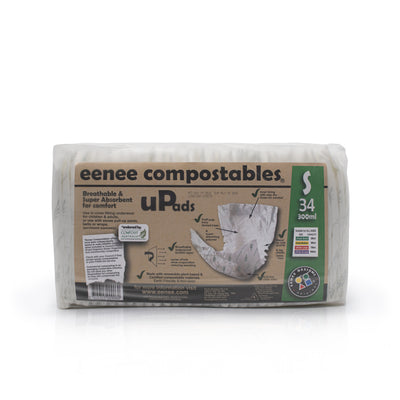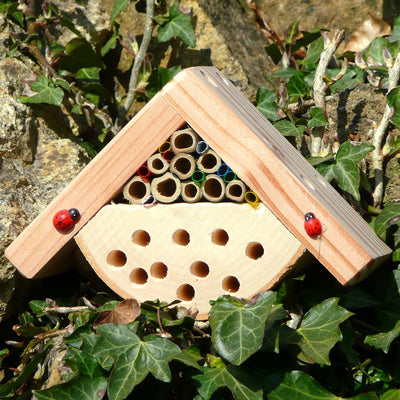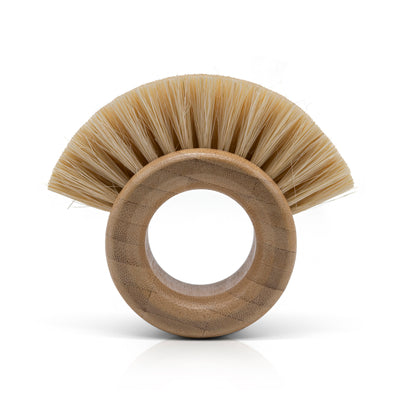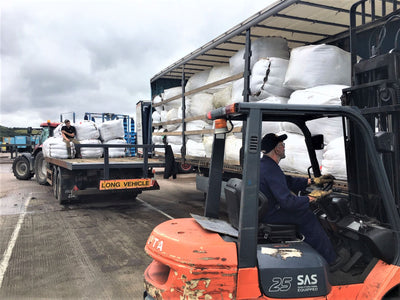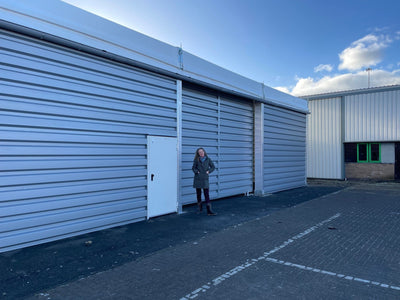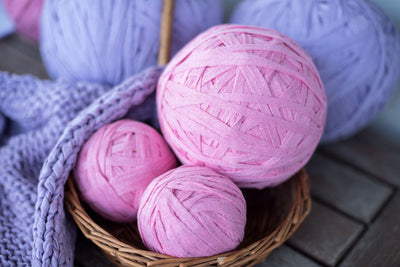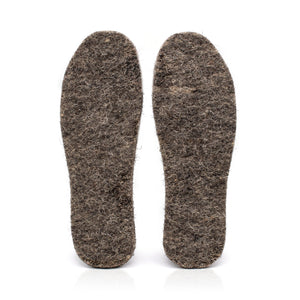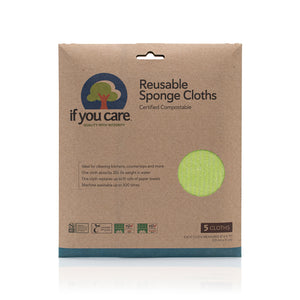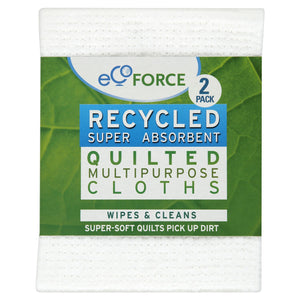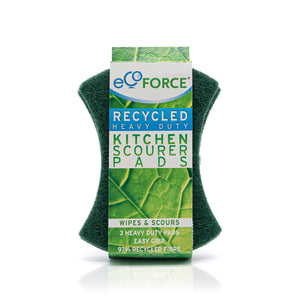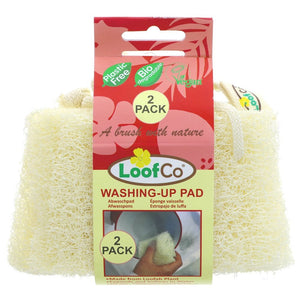Say goodbye to ordinary food waste caddies that always run out of space and undermine your efforts to protect the environment. This recycled plastic kitchen compost caddy is the eco-friendly solution that diverts plastic from landfills and breaks the cycle of plastic pollution while making food waste disposal even more sustainable.
Made in the UK from 100% recycled plastic, this large 23 litre caddy provides ample space for all your household food waste without constantly reaching the brim. With room for days worth of food waste, you’ll be making fewer trips outside to your garden compost bin.
The wide opening lets you easily scrape off leftovers from plates without spillages and the wipe-clean interior prevents messy build up. You can forget about scooping up stray peas from the floor or scrubbing mushy mashed potato from the corners once and for all.
This kitchen food waste caddy also has a sturdy carry handle that locks the lid when upright, and the snap-fitting lid traps moisture and odours for fresher smelling kitchens… No more stinky smells lingering in the corner or wafting up your nose when having breakfast!
If you’re looking for a strong, durable compost caddy for the kitchen that’s designed to store a realistic amount of food waste (and keep those foul smells at bay) while aligning with your eco-values, you’re looking in the right place!
The eagle-eyed may notice this is almost identical to our recycled plastic nappy bucket... Well it is, only this one is green! They both have a 23-litre capacity and feature the same benefits, so it’s down to you to decide which colour you prefer.
What is composting?
Composting is a natural process where organic waste, such as food scraps, grass clippings, and other biodegradable materials, are broken down by microorganisms and turned into a nutrient-rich soil called compost. Compost can then be used as a natural fertiliser to nourish your garden. It’s an environmentally-friendly way to recycle food waste and create a valuable resource for gardening!
Households often use a kitchen food waste caddy or a compost caddy with a locking lid to store food waste during meal preparation. Once the compost caddy bin is full, you can simply empty it into your compost bin in the garden.
Why is composting food waste important?
UK households produce 4.5 million tonnes of food waste every year - that’s almost 2kg of food thrown away each day! What’s worse is that the majority of this food waste is actually edible, costing the average four-person household around £1,000 per year in food bought but not eaten.
When food waste isn’t recycled or composted, it usually ends up in landfill where it rots and releases harmful greenhouse gases into the atmosphere. Composting this food waste at home diverts from landfills and allows nutrients to be returned back to the soil instead. The enriched soil helps your plants, vegetables and flowers grow in your garden or allotment and reduces the need for fertilisers. It's a win-win!
What can you compost?
Most people are aware that you can add typical garden waste to your garden composter, such as grass cuttings, hedge trimmings, weeds, faded flowers, and prunings.
But so much of what we throw away in the kitchen as general rubbish can actually be composted instead.
Lots of types of uncooked kitchen waste can be put in your compost caddy, including fruits and vegetables along with their peelings, baked goods like bread and cakes, eggshells, tea bags and coffee grounds. Even out-of-date or mouldy foods like that loaf of bread you forgot about! But be careful about adding cooked food waste like meat, fish, dairy products and leftover cooked food.
Regular composting uses a cold composting technique that slowly breaks down organic materials over the course of several months, but it’s important to note that this method won’t kill pathogens or bacteria. That means this isn’t suitable for pet waste, compostable nappies or diseased plants and weed roots because the harmful bacteria or pathogens won’t be completely destroyed. You’ll need to hot compost these to kill the harmful bacteria in that waste instead - take a look at the Berkeley Hot Composting Method to learn more about that approach.
What foods can’t you put in the compost
While pretty much any of your kitchen waste can naturally decompose, it's recommended that you avoid adding certain food items and cooked leftovers to your compost piles. This includes things like fish, meat and bones, and dairy products like cheese, yoghurt and spoiled milk.
Why, you ask? The main reason is because these animal products get really smelly when decomposing, which can attract unwanted pests.
Other food waste recycling techniques
That said, there are other methods that allow you to recycle all your cooked and uncooked food waste. One of the simplest ways are food waste digesters like the Green Johanna or Hotbin that use a hot composting method, but they each require different proportions of food waste and garden waste to work properly so you’ll need to do your own research. Another technique is a Bokashi system which ferments your food waste so you can add it to your ordinary compost heap. These are great ways to recycle all your food waste, including all your uneaten takeaway food and plate scrapings - as well as that rather questionable leftover lasagne that’s been lurking at the back of your fridge since last week! You can learn more about the different food waste recycling methods that you can use at home here.
Alternatively, if your local authority runs a food waste recycling scheme in your area, they will usually provide a food waste caddy and offer regular kerbside collections. Pretty much all food waste, except liquids like milk and any non-food items, can go into these, including meat, fish, bones, dairy products and leftover cooked foods. But be sure to check with your council first to find more information and advice about their composting facilities.
How to compost food at home
Composting may seem daunting at first, but it only takes a few minutes a day to get into your routine.
Simplify the process with a kitchen food waste caddy – a handy solution for managing kitchen waste. Keeping a compost caddy in your kitchen works as a reminder to recycle scraps instead of binning them when cooking, baking or preparing meals.
Just scrape food scraps into this spacious container, and when it’s full, toss it into your garden compost bin. It's a convenient way to store days' worth of food waste at a time.
To maintain cleanliness, consider lining the caddy with newspaper or compostable caddy liners. A good spritz of antibacterial spray and a quick wipe down help keep it fresh when it gets a bit messy. With this easy-to-use compost caddy with a locking lid, turning food waste into nutrient-rich compost becomes an easy habit for a greener, cleaner home.
There are lots of ways to compost at home. You can find more information about composting on the RHS website.
Say goodbye to ordinary food waste caddies that always run out of space and undermine your efforts to protect the environment. This recycled plastic kitchen compost caddy is the eco-friendly solution that diverts plastic from landfills and breaks the cycle of plastic pollution while making food waste disposal even more sustainable.
Made in the UK from 100% recycled plastic, this large 23 litre caddy provides ample space for all your household food waste without constantly reaching the brim. With room for days worth of food waste, you’ll be making fewer trips outside to your garden compost bin.
The wide opening lets you easily scrape off leftovers from plates without spillages and the wipe-clean interior prevents messy build up. You can forget about scooping up stray peas from the floor or scrubbing mushy mashed potato from the corners once and for all.
This kitchen food waste caddy also has a sturdy carry handle that locks the lid when upright, and the snap-fitting lid traps moisture and odours for fresher smelling kitchens… No more stinky smells lingering in the corner or wafting up your nose when having breakfast!
If you’re looking for a strong, durable compost caddy for the kitchen that’s designed to store a realistic amount of food waste (and keep those foul smells at bay) while aligning with your eco-values, you’re looking in the right place!
The eagle-eyed may notice this is almost identical to our recycled plastic nappy bucket... Well it is, only this one is green! They both have a 23-litre capacity and feature the same benefits, so it’s down to you to decide which colour you prefer.
What is composting?
Composting is a natural process where organic waste, such as food scraps, grass clippings, and other biodegradable materials, are broken down by microorganisms and turned into a nutrient-rich soil called compost. Compost can then be used as a natural fertiliser to nourish your garden. It’s an environmentally-friendly way to recycle food waste and create a valuable resource for gardening!
Households often use a kitchen food waste caddy or a compost caddy with a locking lid to store food waste during meal preparation. Once the compost caddy bin is full, you can simply empty it into your compost bin in the garden.
Why is composting food waste important?
UK households produce 4.5 million tonnes of food waste every year - that’s almost 2kg of food thrown away each day! What’s worse is that the majority of this food waste is actually edible, costing the average four-person household around £1,000 per year in food bought but not eaten.
When food waste isn’t recycled or composted, it usually ends up in landfill where it rots and releases harmful greenhouse gases into the atmosphere. Composting this food waste at home diverts from landfills and allows nutrients to be returned back to the soil instead. The enriched soil helps your plants, vegetables and flowers grow in your garden or allotment and reduces the need for fertilisers. It's a win-win!
What can you compost?
Most people are aware that you can add typical garden waste to your garden composter, such as grass cuttings, hedge trimmings, weeds, faded flowers, and prunings.
But so much of what we throw away in the kitchen as general rubbish can actually be composted instead.
Lots of types of uncooked kitchen waste can be put in your compost caddy, including fruits and vegetables along with their peelings, baked goods like bread and cakes, eggshells, tea bags and coffee grounds. Even out-of-date or mouldy foods like that loaf of bread you forgot about! But be careful about adding cooked food waste like meat, fish, dairy products and leftover cooked food.
Regular composting uses a cold composting technique that slowly breaks down organic materials over the course of several months, but it’s important to note that this method won’t kill pathogens or bacteria. That means this isn’t suitable for pet waste, compostable nappies or diseased plants and weed roots because the harmful bacteria or pathogens won’t be completely destroyed. You’ll need to hot compost these to kill the harmful bacteria in that waste instead - take a look at the Berkeley Hot Composting Method to learn more about that approach.
What foods can’t you put in the compost
While pretty much any of your kitchen waste can naturally decompose, it's recommended that you avoid adding certain food items and cooked leftovers to your compost piles. This includes things like fish, meat and bones, and dairy products like cheese, yoghurt and spoiled milk.
Why, you ask? The main reason is because these animal products get really smelly when decomposing, which can attract unwanted pests.
Other food waste recycling techniques
That said, there are other methods that allow you to recycle all your cooked and uncooked food waste. One of the simplest ways are food waste digesters like the Green Johanna or Hotbin that use a hot composting method, but they each require different proportions of food waste and garden waste to work properly so you’ll need to do your own research. Another technique is a Bokashi system which ferments your food waste so you can add it to your ordinary compost heap. These are great ways to recycle all your food waste, including all your uneaten takeaway food and plate scrapings - as well as that rather questionable leftover lasagne that’s been lurking at the back of your fridge since last week! You can learn more about the different food waste recycling methods that you can use at home here.
Alternatively, if your local authority runs a food waste recycling scheme in your area, they will usually provide a food waste caddy and offer regular kerbside collections. Pretty much all food waste, except liquids like milk and any non-food items, can go into these, including meat, fish, bones, dairy products and leftover cooked foods. But be sure to check with your council first to find more information and advice about their composting facilities.
How to compost food at home
Composting may seem daunting at first, but it only takes a few minutes a day to get into your routine.
Simplify the process with a kitchen food waste caddy – a handy solution for managing kitchen waste. Keeping a compost caddy in your kitchen works as a reminder to recycle scraps instead of binning them when cooking, baking or preparing meals.
Just scrape food scraps into this spacious container, and when it’s full, toss it into your garden compost bin. It's a convenient way to store days' worth of food waste at a time.
To maintain cleanliness, consider lining the caddy with newspaper or compostable caddy liners. A good spritz of antibacterial spray and a quick wipe down help keep it fresh when it gets a bit messy. With this easy-to-use compost caddy with a locking lid, turning food waste into nutrient-rich compost becomes an easy habit for a greener, cleaner home.
There are lots of ways to compost at home. You can find more information about composting on the RHS website.



